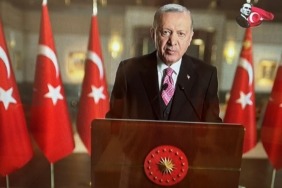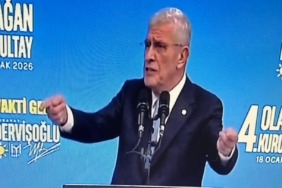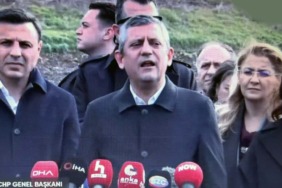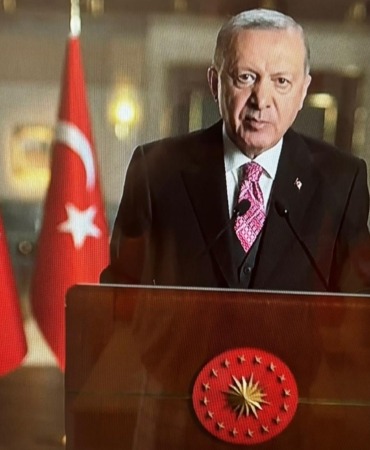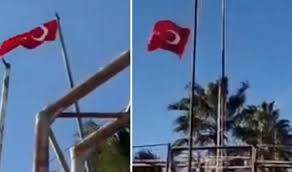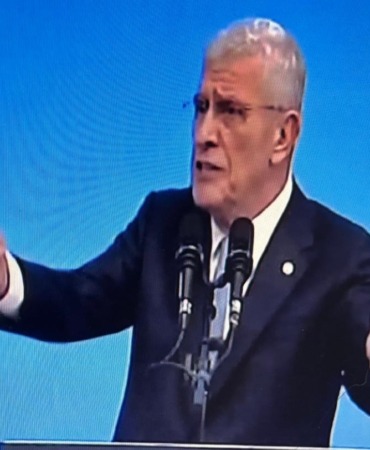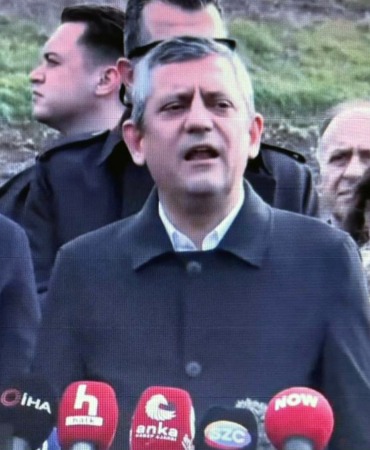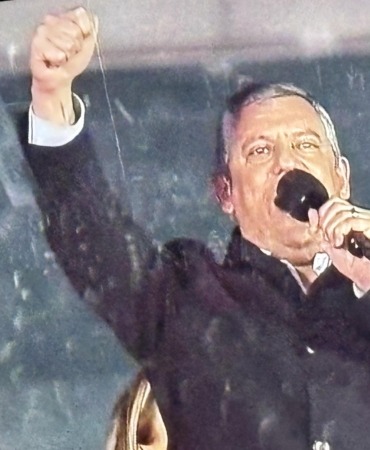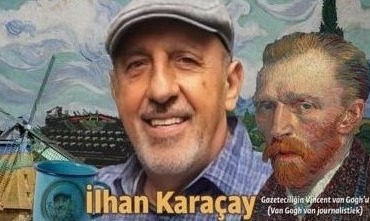After a month and a half of deadlock, Turkish President Recep Tayyip Erdogan finally relented this week on Sweden’s and Finland’s bids to become NATO’s newest member states.
President Joe Biden, who encouraged and reportedly spent months behind the scenes trying to push through the Nordic nations’ accession, was beaming at the Turkish-Finnish-Swedish compromise. “I want to particularly thank you for what you did putting together the situation with regard to Finland and Sweden,” Biden told Erdogan at the start of their bilateral meeting on the sidelines of this week’s NATO summit. “You’re doing a great job.”
At its core, the Trilateral Memorandum seeks to address Turkey’s security concerns in exchange for Ankara allowing Finland’s and Sweden’s NATO applications to move forward. The Finnish and Swedish foreign ministers sought to placate Erdogan’s complaints about the Kurdistan Workers’ Party, or the PKK, which Turkey and the U.S. categorize as a terrorist group, pledging to “prevent activities of the PKK and all other terrorist organizations and their extensions,” as well as disrupt PKK fundraising activities. The Finns and Swedes also agreed “to address” Turkey’s extradition requests against individuals the Turkish government alleges are engaged in terrorist activity. At first glance, it would appear that Erdogan used his leverage to extract significant concessions.
But no agreement is worth the paper it’s written on if the parties don’t live up to the bargain. Negotiating, drafting, and signing an accord is only half the battle. Just as important is the implementation. And that’s where this memorandum will likely get into trouble.
There is already a dispute between Turkey, Finland, and Sweden about expectations. Erdogan appears to be under the impression that a specific list of 73 people will be extradited to Turkey for prosecution. But the memorandum makes no mention whatsoever about specific people, only a vague promise that Turkey’s extradition requests will be considered as expeditiously as possible. Finland says that no discussions about people occurred during the negotiations. The memorandum is also vague enough for Sweden and Finland to argue they are in fact complying with the terms when, in fact, Turkey could just as credibly argue the opposite.
And that’s why the entire document is a bit fuzzy. It’s written in such a way that all of the parties can walk away thinking they accomplished their main objectives. But the different interpretations can cause trouble and potentially doom the document to irrelevance. While keeping terms somewhat general may help clinch a deal, it can also prove to be poison when it comes time for the parties to abide by it.
Why does any of this matter?
Well, because if Finland and Sweden hope to join NATO as members, then both countries may have to cater to Erdogan’s wishes on the extradition issue. The NATO accession process is a lengthy one, and it normally takes up to a year before all of the steps are completed. Turkey only agreed to allow Finland’s and Sweden’s applications to be processed; they haven’t accepted those applications. In other words, Erdogan can still utilize his veto power to stall the accession process in its tracks if he doesn’t believe Helsinki or Stockholm are living up to their commitments. Indeed, Erdogan has already telegraphed that this is exactly the tact he intends to take if his demands aren’t met.
Given Erdogan’s behavior, NATO should take his words to heart. The Turkish president isn’t afraid to ruffle feathers or stand in as the black sheep of the NATO family. Turkey’s decision to purchase and operate the Russian S-400 missile defense system and the multiple Turkish military operations that have occurred in Syria since 2016 (often targeting the very Kurdish militants the U.S. and NATO rely on to keep tabs on ISIS), illustrate a highly independent power more than willing to frustrate the alliance for the sake of the national interest. None of us should expect anything different with the Trilateral Memorandum.
Daniel DePetris (@DanDePetris) is a contributor to the Washington Examiner’s Beltway Confidential blog. His opinions are his own.

Bir buçuk aylık çıkmazın ardından, Türkiye Cumhurbaşkanı Recep Tayyip Erdoğan nihayet bu hafta İsveç ve Finlandiya’nın NATO’nun en yeni üye ülkeleri olma hedeflerinden vazgeçti.
İskandinav ülkelerinin üyeliğini ilerletmek için sahne arkasında aylarca teşvik eden ve bildirildiğine göre Başkan Joe Biden, Türk-Finlandiya-İsveç uzlaşmasına ışık tutuyordu. Biden, bu haftaki NATO zirvesinin oturum aralarında yaptığı ikili görüşmenin başında Erdoğan’a verdiği demeçte, “Finlandiya ve İsveç’teki durumu bir araya getirmek için yaptıklarınız için özellikle teşekkür etmek istiyorum.” “Harika bir iş çıkarıyorsun.”
Üçlü Mutabakat, özünde Ankara’nın Finlandiya ve İsveç’in NATO uygulamalarının ilerlemesine izin vermesi karşılığında Türkiye’nin güvenlik endişelerini ele almayı amaçlıyor. Finlandiya ve İsveç dışişleri bakanları, Erdoğan’ın Türkiye ve ABD’nin terör örgütü olarak sınıflandırdığı Kürdistan İşçi Partisi (PKK) hakkındaki şikayetlerini “PKK ve diğer tüm terör örgütlerinin faaliyetlerini ve uzantılarını engelleme” sözü vererek yatıştırmaya çalıştı. ” PKK’nın bağış toplama faaliyetlerini bozmanın yanı sıra. Finliler ve İsveçliler, Türkiye’nin, Türk hükümetinin terörist faaliyetlerde bulunduğunu iddia ettiği kişilere yönelik iade taleplerini “ele alma” konusunda da anlaştılar. İlk bakışta, Erdoğan kozunu önemli tavizler elde etmek için kullanmış gibi görünüyor.
Ancak taraflar pazarlığa uymuyorsa hiçbir anlaşma, üzerinde yazılı olduğu kağıt kadar değerli değildir. Müzakere etmek, taslak hazırlamak ve bir anlaşma imzalamak savaşın sadece yarısıdır. Aynı derecede önemli olan uygulamadır. Ve bu muhtıranın muhtemelen başını belaya sokacağı yer burası.
Türkiye, Finlandiya ve İsveç arasında beklentiler konusunda zaten bir anlaşmazlık var. Erdoğan, 73 kişilik belirli bir listenin yargılanmak üzere Türkiye’ye iade edileceği izlenimini edinmiş görünüyor. Ancak muhtırada belirli kişilerden hiç bahsedilmiyor, sadece Türkiye’nin iade taleplerinin mümkün olduğunca hızlı bir şekilde değerlendirileceğine dair belirsiz bir vaat var. Finlandiya, müzakereler sırasında insanlarla ilgili hiçbir tartışmanın yaşanmadığını söylüyor. Mutabakat ayrıca İsveç ve Finlandiya’nın şartlara uyduklarını iddia etmeleri için yeterince muğlak, oysa Türkiye aynı derecede inandırıcı bir şekilde tam tersini iddia edebilir.
Ve bu yüzden tüm belge biraz bulanık. Öyle bir şekilde yazılmıştır ki, tüm taraflar ana hedeflerine ulaştıklarını düşünerek uzaklaşabilirler. Ancak farklı yorumlar soruna neden olabilir ve potansiyel olarak belgeyi ilgisizliğe mahkûm edebilir. Şartları biraz genel tutmak bir anlaşmanın yapılmasına yardımcı olabilirken, tarafların buna uyma zamanı geldiğinde de zehir olduğunu kanıtlayabilir.
Bu neden önemli?
Çünkü Finlandiya ve İsveç üye olarak NATO’ya katılmayı umuyorsa, o zaman her iki ülke de iade konusunda Erdoğan’ın isteklerini yerine getirmek zorunda kalabilir. NATO üyelik süreci uzun bir süreçtir ve normalde tüm adımların tamamlanması bir yıl kadar sürer. Türkiye yalnızca Finlandiya ve İsveç’in başvurularının işlenmesine izin vermeyi kabul etti; bu başvuruları kabul etmediler. Başka bir deyişle, Helsinki veya Stockholm’ün taahhütlerini yerine getirdiğine inanmıyorsa, Erdoğan veto yetkisini üyelik sürecini rayında durdurmak için kullanabilir. Nitekim Erdoğan, taleplerinin karşılanmaması durumunda tam olarak böyle bir taktiğin olduğunu telgraf etti.
Erdoğan’ın davranışı göz önüne alındığında, NATO onun sözlerini ciddiye almalı. Türk cumhurbaşkanı, tüyleri karıştırmaktan veya NATO ailesinin kara koyunu olarak yer almaktan korkmuyor. Türkiye’nin Rus S-400 füze savunma sistemini satın alma ve çalıştırma kararı ve 2016’dan bu yana Suriye’de meydana gelen çok sayıda Türk askeri operasyonu (genellikle ABD ve NATO’nun IŞİD’i takip etmek için güvendiği Kürt militanları hedef alıyor), son derece önemli bir örnek teşkil ediyor. bağımsız güç, ulusal çıkar uğruna ittifakı boşa çıkarmaya istekli olmaktan daha fazla. Hiçbirimiz Üçlü Muhtıra ile farklı bir şey beklememeliyiz.
Daniel DePetris (@DanDePetris), Washington Examiner’ın Çevre Yolu Gizli bloguna katkıda bulunan bir kişidir. Görüşleri kendisine aittir.


